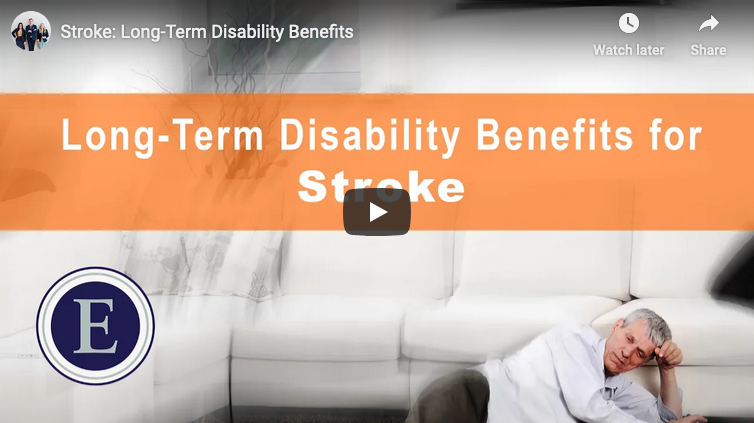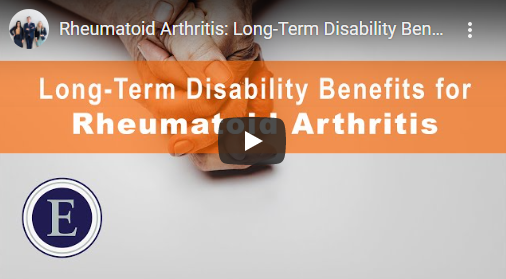Do I Qualify for Long-Term Disability Benefits if I Have Alzheimer’s Disease?
Can I Get Long-Term Disability Benefits for Alzheimer’s Disease?
One of the most common questions we get is “Do I qualify for long-term disability benefits if I have Alzheimer’s Disease?”
Alzheimer’s Disease (AD) is a progressive nervous system disorder that causes brain cells to die and atrophy, the shrinkage of nerve tissues. Alzheimer’s symptoms, memory loss and other cognitive impairments, have a significant impact on a person’s employment and daily life.
Therefore, Alzheimer’s Disease can qualify for long-term disability benefits – provided it is not excluded by your insurance policy wording.
LTD Denied? Which Category Do You Fit In?
Category 1: The insurance company denied your initial claim for disability benefits for Alzheimer’s Disease.
Category 2: The insurance company denied your appeal.
Category 3: The insurance company discontinued or terminated your benefits.
What Can We Do For You?
We’ll work with you and your physician to help challenge the insurance company’s denial or discontinuance of your long-term disability benefits.
Where necessary, we will engage other trusted professionals to support your case including specialists, functional capacity evaluators, and vocational evaluators to help credibly explain why your disability symptoms are preventing you from doing your “own occupation” or “any occupation”.
Our Help Can Make All The Difference. How?
- Over 25 years’ combined experience getting our clients the benefits they deserve.
- Expertise in both disability and employment law (your employment status is directly linked with your disability)
- We offer a free case assessment
- We offer flexible rates, including contingency fees (i.e., only pay if you win)
- Service across all of Ontario


Alzheimer’s Disease: Overview
Alzheimer’s disease is a condition of the nervous system in which proteins behave abnormally and disrupt nerve connections.
When these connections are broken, the hippocampus, the part of the brain responsible for memory, loses function.
As the disease progresses, more cells die and shrinkage occurs, creating issues with behaviour, judgement, intelligence, and language.
Alzheimer’s is an abnormality of the brain not fully understood. It is believed that a combination of genetics, environment and lifestyle is the cause of most people’s Alzheimer’s.
Other risk factors include:
- Age
- Sex
- Head trauma
- Mild cognitive impairment (MCI)
- Air pollution
- Alcohol consumption
- Poor sleep patterns [1]
Intensity of the symptoms is extremely variable from person to person. Some individuals are almost completely disabled, while others are in the early stages of their symptoms.
There is no cure for Alzheimer’s, but medications can temporarily reduce symptoms in some patients.
Studies have shown that Alzheimer’s is associated with the following:
- Depression
- Osteoporosis and osteoarthritis
- Cerebrovascular disease (CVD)
- Diabetes [2]
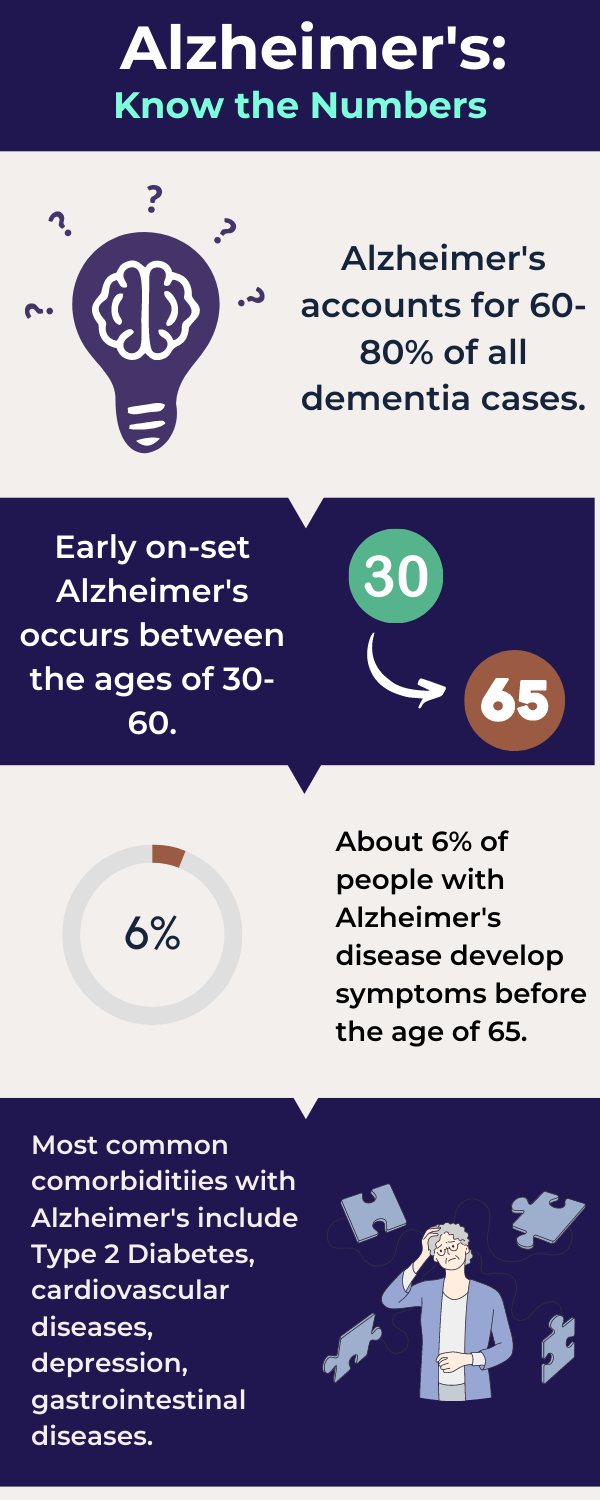
Most Common Symptoms of Alzheimer’s Disease
Alzheimer’s disease is mainly associated with:
Repetition: questions or phrases are repeated, as newly learned information is forgotten.
Memory loss: forgetting conversations, important dates, and not retaining information.
Judgement and decision making: becomes difficult to respond to everyday obstacles, such as dressing for the weather or putting out a kitchen fire.
Other symptoms can include:
- Getting lost in familiar places
- Forgetting names of people or everyday objects
- Apathy
- Mood swings
- Distrust
- Social withdrawal
- Wandering
- Changes in sleeping patterns [1]
Important: Many people with Alzheimer’s disease become discouraged and overwhelmed, which can lead to depression and anxiety.
Criteria for a Diagnosis of Alzheimer’s Disease
There is no single test to confirm if you have Alzheimer’s disease. Doctors rule out other conditions to make a diagnosis and conduct tests to identify functional changes and impairments.
The main diagnostic criteria for early onset Alzheimer’s, provided by the National Institute of Health, includes the following:
- A change in cognitive function compared to previous years
- Impairment of multiple cognitive functions at a rate greater than expected for a person’s age
- Complex tasks are more difficult than before
- Dementia hasn’t set in
In the early stages of Alzheimer’s disease, the diagnosis is based, to a large extent, on self-reported symptoms, and long-term disability insurers often deny these claims.
Treatment for Alzheimer’s Disease
There is no cure for Parkinson’s disease, however symptoms can be treated with both medication-based and therapy-based treatments.
Medication
The most commonly used medications are Donepezil (Aricept), Galantamine (Razadyne), and Rivastigmine (Exelon). These are used to treat mild to moderate Alzheimer’s. A recently developed medication, aducanumab, is also available and may help slow Alzheimer’s progression.
As nerve cells continue to breakdown, the medications lose effectiveness. Though they do not cure Alzheimer’s, they provide symptom relief for some patients.
Therapy
As each case of Parkinson’s disease is difference from another, therapies such as the following may or may not help reduce stress or symptoms in Alzheimer’s patients:
- cognitive behavioural therapy
- psychotherapy
- massage therapy
- acupuncture
- biofeedback
- chiropractic
- homeopathy
- hypnotherapy
- mental imaging
- naturopathy
- osteopathy

Alzheimer’s Disease & Your Employment
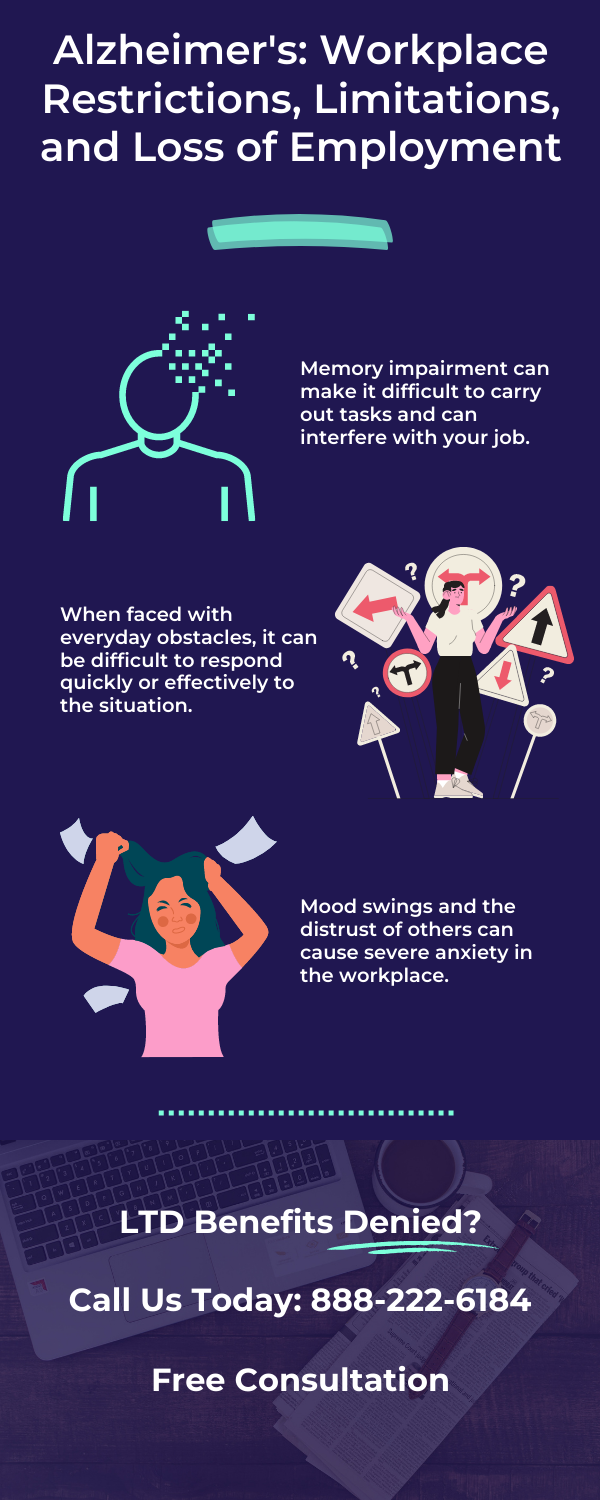
Workplace Restrictions Caused by Alzheimer’s Disease
When considering your employment and Alzheimer’s Disease diagnosis, consider how stable your condition is, how safe you are to do your job and what the demands are physically and mentally.
Many individuals suffering from Alzheimer’s Disease may experience fatigue, confusion, and a lack of awareness.
Alzheimer’s Disease and Workplace Discrimination
It is unlawful to discriminate against someone in the area of employment based on their physical disability: Ontario’s Human Rights Code and the Canadian Human Rights Act.
If you are suffering from Alzheimer’s Disease, you might face discrimination in a variety of ways:
- You experience employment termination because you have Alzheimer’s Disease.
- You are denied accommodation because of your Alzheimer’s Disease.
- After returning from a disability leave, your employer places you in a lower, part-time position at a lower rate of pay.
- Someone makes unwelcome remarks or jokes about your disability.
- Someone offends or humiliates you physically or verbally threatens or intimidates you because of your disability.
- Retaliating against you for filing a human rights complaint.
Ertl Lawyers are experts in Employment and Disability Law. If you have been discriminated against, our disability and employment lawyers in Toronto can help, including:
- Having your employer comply with their duty to accommodate you.
- Having your employer stop all forms of discriminatory conduct.
- Representing you in wrongful dismissal in Ontario, constructive dismissal, and human rights matters.
- Ensuring that your employer complies with its statutory obligations, including its obligations under the Employment Standards Act.
- Negotiation severance packages (including continuation of benefits).

Alzheimer’s Disease & Insurance Companies
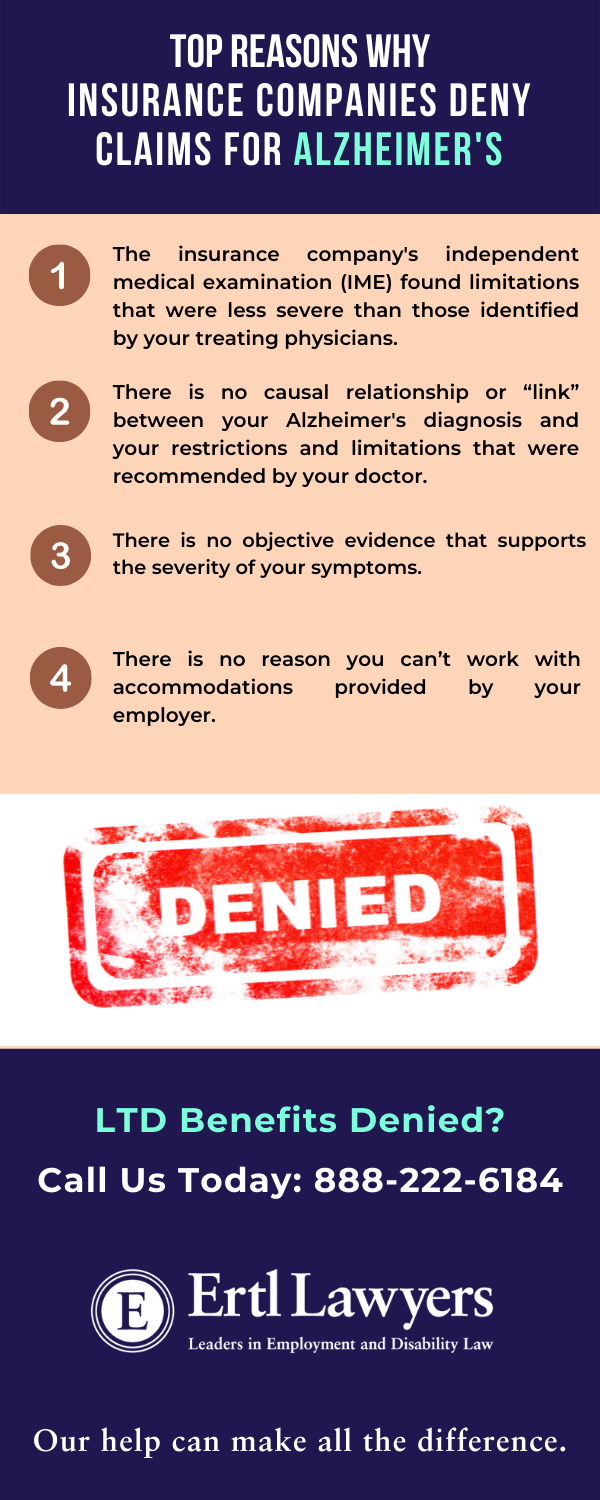
Apply for Long-Term Disability Benefits for Alzheimer’s Disease?
Review Your Policy Carefully
Your entitlement to long-term disability benefits for Alzheimer’s disease depends on the specific wording of your disability policy.
As noted, some policies outright exclude Alzheimer’s disease coverage or else consider it a “mental disorder” (and seek to limit the amount of benefits).
It is important that you understand how the insurance company defines things like “totally disabled,” “occupation,” “mental disorder, “self-reported condition” – and whether any exclusions apply (particularly for pre-existing conditions).
Bottom line: You need to know what your policy says before you apply for benefits.
Gather Medical Evidence
To be entitled to long-term disability benefits for Alzheimer’s disease, every insurer requires you to provide medical evidence documenting your diagnosis and that your illness or injury causes restrictions or lack of ability, such that you are prevented from performing the essential duties of your occupation.
It is recommended that you get treated by a medical professional who will diagnose your condition using established criteria.
It is also recommended that you provide to the insurer results of any Functional Capacity Evaluation or cognitive testing that objectively documents your physical and (if applicable) mental limitations.
Gather Evidence of Workplace Limitations
Because your entitlement to long-term disability benefits for Alzheimer’s disease depends on the strength of your evidence, you should get a copy of your employee file from work. It may show that your Alzheimer’s disease has negatively impacted your work performance. Your work performance may have been affected by your pain, fatigue, cognitive impairment, or other symptoms.
Create a List of the Physical Duties of Your Job
You should get a copy of your job description. Based on that job description, you should write out a detailed list of the physical (and mental) duties associated with your job description – and explain how your Alzheimer’s disease limits or prevents you from performing you own occupation.
Follow Your Doctor’s Treatment Plan
Your entitlement to long-term disability benefits also requires you to be receiving regular, ongoing care and treatment for your Alzheimer’s disease. In other words, don’t skip appointments, and always follow your doctor’s treatment plans.
Keep a Diary
On your end, it is important to keep a diary. A diary is a written record that helps you keep track of when your symptoms and whether your treatment is helping.
What Other Benefits Might I Be Entitled to for Parkinson’s Disease?
Other than short-term and long-term disability benefits through a group or individual insurance plan, people suffering from Parkinson’s disease might be entitled to one or more of the following benefits:
- Employment Insurance (EI) Sickness Benefits;
- Ontario Disability Support Plan (ODSP);
- Disability Tax Credit (DTC);
- Disability Creditor Insurance (under your mortgage or credit cards);
- Trillium (extended health benefits);
- Canada Pension Plan Disability (CPP-D); and
- Disability Pension (employer).
Organizations / Associations / Colleges
- Alzheimer’s Association
- Alzheimer Society of Canada
- American Brain Foundation
- Cure Alzheimer’s Fund
- Alzheimer’s Drug Discovery Foundation
Disclaimer: The content on this web site is provided for general information purposes only and does not constitute legal, medical, or other professional advice or an opinion of any kind. Users of this web site are advised to seek specific legal advice by contacting members of Ertl Lawyers (or their own legal counsel) regarding any specific legal issues. Ertl Lawyers does not warrant or guarantee the quality, accuracy or completeness of any information on this web site
Sources:
[1] https://www.mayoclinic.org/diseases-conditions/alzheimers-disease/symptoms-causes/syc-20350447
[2] https://pubmed.ncbi.nlm.nih.gov/29660933/
[3] https://www.nia.nih.gov/health/how-alzheimers-disease-treated
Long-Term Disability Benefits Denied?
Ertl Lawyers provides expert representation in long-term disability matters.
The vast majority of disability matters are resolved through negotiation and mediation – and that’s because insurance companies know that we are passionate about our clients’ rights.
How we can help you:
• free disability policy analysis
• free case assessment
• applying for disability benefits
• appealing a denial or termination of your benefits
• disputing a denial through a legal claim
• handling all communications with your employer
• protecting your employment
• prosecuting human rights claims
Fair, Flexible Rates – Including Contingency Fees
(Don’t Pay Unless You Win)
Our Help Can Make All The Difference.
Related Blogs
Understanding the Importance of Medical Evidence for Disability Claims
Claims for long-term disability benefits are routinely denied by insurance companies. They deny them for any number of different reasons, but the most common is that there isn’t enough medical evidence to support the claim that your condition is preventing you from...
Why Long-Term Disability Claims Get Denied by Insurance Companies
Injuries and illnesses happen to everyone. But what if someone is severely injured in an accident that requires months of full-time medical care or develops a condition so overwhelming that they can no longer perform routine tasks? Many employer and self-provided...
Mental Health Disability Claims: A Guide to Mental Health & Disability in Ontario
We've come a long way in our understanding and attitudes towards mental health issues, specifically in the workplace. Governments at both the federal and provincial levels emphasize the importance of awareness around mental wellness and the impact of the workplace on...




